Everett Maroon's Blog, page 25
April 16, 2012
Justice of Opportunity
UPDATE: You can call Michael Freeman at 612-348-5540 and Marlene Senechal at 612-348-5561, the prosecutors in CeCe McDonald’s case. Tell them you are calling as a supporter of Ms. Chrishaun McDonald and are concerned about her case.
 The United States tells its citizens and residents that it is a nation governed by the Rule of Law–that everyone is equal under the eyes of these laws, and that our system of jurisprudence and law protects us as individuals and collectively. And yet even laws that look simple on the surface; say–speeding on a roadway–are experienced very differently across intersections of race, class, gender, and gender identity. Does the driver receive a citation? A warning? Is the driver asked to exit the vehicle? Is the vehicle searched? Is the driver asked to prove citizenship or residency status? Does the driver’s ID match their gender presentation? Is the vehicle presumed to be street legal? What level of suspicion does the officer presume about the driver?
The United States tells its citizens and residents that it is a nation governed by the Rule of Law–that everyone is equal under the eyes of these laws, and that our system of jurisprudence and law protects us as individuals and collectively. And yet even laws that look simple on the surface; say–speeding on a roadway–are experienced very differently across intersections of race, class, gender, and gender identity. Does the driver receive a citation? A warning? Is the driver asked to exit the vehicle? Is the vehicle searched? Is the driver asked to prove citizenship or residency status? Does the driver’s ID match their gender presentation? Is the vehicle presumed to be street legal? What level of suspicion does the officer presume about the driver?
Laws, after all, are written by people, and people come to the act of writing laws with their own sets of intent and motivation. People also are fallible. How else to explain the state of Kansas’s overreaching to restrict voting rights based on some observed “need” for security, when there is next to no evidence that individuals cheat the voting system, nationally or in Kansas specifically? Or as Dr. Jen Gunter notes in her pro-choice blog, how do we explain the non-medical, non-scientific, non-rational laws written to restrict reproductive rights for women?
Once we move past the idealized notion of equality in the eyes of the law—which incarcerates black men 6 times as often as white men, and poor people significantly more often than people at the middle-top (and above) of the socioeconomic ladder—we are able to assess the “spectacular” crime moments of culture. These are the cases that get stuck in the craw of the news media or make their way to the surface of our collective consciousness.
When I think about the Trayvon Martin/George Zimmerman case and the CeCe McDonald case, contradictions in how we think about physical confrontation and the law’s interpretation of same leap out at me. What are those contradictions? Well, in no particular order, I see the following:
While homicide laws are similar across the country, other laws that transect with definitions of homicide may affect arrest and investigation procedures, and sentencing. In Florida, Zimmerman’s new attorney intends to use the “Stand Your Ground” law to show that Zimmerman had the right to shoot Martin with impunity. Even though the facts of the case show Zimmerman as the initial aggressor (and even though police dispatch told him to cease following Martin), SYG allows for the initial aggressor to justify the later use of force if an altercation causes him to be concerned for his life. Think about that in light of all the conversations we’ve had nationally regarding bullying. Minnesota, which has no SYG law similar to Flordia’s, has put CeCe McDonald, who was fending off attackers who had already lacerated her face with a broken beer bottle, on trial for one man’s death.
Our sense of sympathy for crime victims varies according to their race, class, gender, and gender presentation. Somehow the mob of people spouting off the n-word and transphobic blather were more sympathetic to prosecutors in Minneapolis than an unarmed 17-year-old who was bringing snacks home to his little brother. Again, the “law” should be blind to how appealing a victim was; biased human judgment is another issue. Before anyone starts arguing that such sympathy isn’t important in these cases, consider that for McDonald, this lack of sympathy is part of what has put her on trial for second degree murder.
If the law is supposedly equal, the defenses for the accused are definitely not. Zimmerman, once he was arrested last week, got a new attorney, Mark O’Mara, who is used to high-profile cases and has 30 years in criminal defense. McDonald’s defense is much less expensive, but thankfully has gotten some attention from progressive and LGBT groups. I question the efficacy of her defense; how was a $500,000 bail for a poor 23-year-old student justified in court?
In both cases, people of color spoke up against harassment. Martin confronted Zimmerman about being followed, and McDonald responded to the older white group of people who suggested she was a rapist, f@ggot, and n*gger. Now Martin is dead and McDonald is on trial, which makes me ask why white people feel they are entitled to harass people of color. Okay, I have some ideas as to why that are probably pretty obvious, but I also point to our political leaders for allowing fringe ideas to so permeate our national consciousness. After years of anti-immigration rhetoric, anti-terrorist rhetoric, anti-social safety net policies, anti-women’s health policy and law, hyper individualistic messaging about what our taxes go to support (read: Iraq and Wall Street), and the like, the weaker minded of us feel they have a platform for their bigotry. Yes, last month’s week-long diatribe from Rush Limbaugh about birth control and the women who use it sounded ridiculous to most of us, but for a scant few in the country, it fueled their misogynistic anger. It led some people to believe there’s a place for their archaic notions of womanhood and agency. So too has all of the birther, “he’s a socialist communist Muslim” nonsense led some people to increase their own righteousness as racists. And where the law should have stepped in to challenge hate speech or hate crimes, it has instead dragged its feet to arrest a killer, and unjustly accused a woman who defended her life.
We have a national fascination with the criminal justice system, but we understand it as inaccurately as possible. I can’t count all of the cop shows on television, the ones that portray how valiant and heroic our police and prosectors are, how incredibly lucky we are to have our system of jurisprudence and justice. It may have its strengths, and I’m sure many people go into law enforcement for all of the right reasons. Zimmerman himself is evidence that when someone has a lust for guns and power, the system can act to keep them out as authorized agents of the law, as has been his personal history. (Zimmerman still found a legal way to get a gun, which flies in the face of the rhetoric from the NRA.) However, as anyone who has lived through losing someone to a homicide can tell you, the system does not work at all like it’s portrayed on TV. DNA evidence, if it’s even collected at a scene, takes months if not years to come back, aggressors are often allowed to walk free well after an incident, good cases are thrown out on technicalities all the time, jury deliberations are prone to groupthink and bias, and sentencing is all over the place—often too light or too punitive, considering the crime. It’s not so surprising to me that Zimmerman wasn’t arrested even a month after Martin’s death (it was somewhat surprising that no evidence had been collected at the scene), because they often aren’t. The national average closure rate for homicide cases is 56 percent. Killers can pretty much flip a coin—the idea carved out by CSI, NCIS, and other forensic shows that a single strand of carpet fiber will doom a perpetrator is an entire fiction. Thus, who gets arrested, arraigned, and convicted ought to be as suspicious to us, as a question of how the criminal justice system is functioning.
I want justice for Trayvon Martin. I want justice for CeCe McDonald. I am wholly incensed that their lives have met these ends; that they faced such incredible distrust and disrespect. To hear Zimmerman talk of how his life has been ruined by his own actions is to dismiss the life that Martin no longer has. And to insist on using male pronouns for McDonald when she clearly identifies as female—which the prosecutor keeps doing—is to telegraph to reasonable people that at least part of his motivation for filing charges against her is transphobia, which puts him in exactly the same group as the people who attacked her last June.
We must demand better of ourselves and our civil servants.








April 14, 2012
Writing Under Water
 The advice is to write every day, if you’re calling yourself a writer, that is. Every day. It’s a model of dependency because hey, writers love their stereotypes about being alcoholic. Or it’s a model about routines, the creative equivalent of tooth brushing. No, no, it’s about opening a space so the words can flow . . . into the drainage ditch of bad ideas. Okay, wait. Telling people to write every day is about injecting seriousness into what would otherwise be a simple hobby or a flirtation that never gets off the ground. Certainly there are a lot of people out there who talk about someday writing a book, but the last time they sat down to type it was on a brand new IBM Selectrix typewriter.
The advice is to write every day, if you’re calling yourself a writer, that is. Every day. It’s a model of dependency because hey, writers love their stereotypes about being alcoholic. Or it’s a model about routines, the creative equivalent of tooth brushing. No, no, it’s about opening a space so the words can flow . . . into the drainage ditch of bad ideas. Okay, wait. Telling people to write every day is about injecting seriousness into what would otherwise be a simple hobby or a flirtation that never gets off the ground. Certainly there are a lot of people out there who talk about someday writing a book, but the last time they sat down to type it was on a brand new IBM Selectrix typewriter.
Stephen King, prolific author that he is, put it simply in the last millennium: writers write. Writers don’t talk about writing and not write. They write. (Apologies to Mr. King for my awful paraphrasing.)
What happens when say, the family goes on vacation? The writer finds some time to make writing happen, according to this unofficial doctrine. At some point, it begins to sound selfish. Honey, wait one more hour before you start pushing, because I’m almost done with this chapter! I know the doctor says you’re good to go, but I’ve got my own creative baby here!
Outside of my extreme and ridiculous example, it remains that there are times when one can’t make it to a solid hour of writing time. Let’s say a person goes from Sunday to the following Friday before opening his laptop, for hypothetical example. He’s not suddenly something other than writer. Maybe he got a couple of books written when he was unemployed and/or working 20 hours a week. And perhaps he’s struggling to find quality writing time between his full-time job, 7-month-old baby, and accidental but necessary naps. He’s still a writer, damn it.
Or maybe he just plays one on TV.
My point is this: yes, writers write, but sometimes life tosses some knuckle balls out and then it’s incumbent on the writer to find new ways to open up time to work on projects. It doesn’t have to be neat or fancy, since of course we’ve all long ago given up on perfect. It just has to help us produce new words. If 11PM is all we can grab in a three-day stretch, then 11PM it is.
There are a lot of articles out there on how to manage creative time when one has a 40-hour-a-week job, but I haven’t seen much about how to adjust to a changing, or fluid schedule. As I’ve written before in this blog, I’ve worked to shift my writing approach so that I hit the ground faster and get started sooner, rather than take the first half hour to get into the best head space possible. I’ve also learned to plug my ears if I’m working in a loud space; even though I like chaotic places I acknowledge that with increased time pressure comes a decrease in my ability to filter out noise.
Someday, I may need to write during a volcanic explosion, and I’ll be ready. Well, as long as I’m out of reach of the floes, and as long as nobody else needs me for anything. But I’ll still call myself a writer, darn it.
It would be terrific if I could squirrel away writing time like acorns, and scrabble at the ground when I needed a snippet of time in an otherwise time-crunched day. If that were possible, however, I’d probably wind up screwing it up, and forgetting where I put the 150 minutes I thought I needed to finish an online article or short story; most likely I’d obsess over whether my time-acorns were buried well enough against the motivations of other writers. And that would all be more time not spent working. It sounds like a vicious cycle.
I guess I better think it out again. Okay, so no time-acorns.
One functional way to handle either a sudden or steady decrease in available writing time is to work with the other members of one’s household in carving out some hours for the week ahead. I can let go of writing first thing in the morning. Writing at a certain hour may have worked well in the past, or agree with the way in which my brain is wired, but we’re all about adaptability around here these days (or until Emile is 16). If I bottle my words up for long enough, they stop giving a crap when I lay them down on the screen. Beggars, choosers, that sort of thing.
So it’s write when I can, trying to identify good times for writing, and enjoying the hell out of the rest of my life. I can’t worry about my writer label. I don’t have the time.








April 7, 2012
My Relationship to Ducks
[image error]The reward for staring into the back of a pew for an hour every Sunday morning was a brief respite at the neighborhood duck pond. Catholic Mass probably would have been more torturous for my toddler self if the powers that be hadn't left Latin behind, but as it was, all of the sermons and readings sounded muffled or mumbled. My strategy was to sit on my hands and wait for my two activities to arrive: passing the collection basket and shaking the hands of the people around me. Then I got to go and spread my love and all, as ordered by our pastor.
But really, I just wanted to feed the ducks.
Current proscriptions about sharing food with wild animals what they are, in the mid-1970s nobody balked at me showing up weekly with stale scraps of bread bundled in the plastic wrap of the loaf packaging. I would size up the attendees, doing something of a rough headcount, and then break up my supply of carbs accordingly. Girl ducks, less colorful than the mallards, got a little more, but my favorite recipient of the bunch was a one-legged duck who hopped to get around. He seemed not to like being in the water because his one-sided webbing made it difficult for him to go where he wanted in the pond. Even as a very young child I preferred the underdog, and I'd do whatever I could to ensure he got all of the bites I intended for him.
Feeding these ducks included quacking at them, which I did to convince myself that I was some kind of waterfowl whisperer, though in hindsight, I can see that they were just inclined to stream toward a small human–dressed in his Sunday best–with food. But at the time I saw this as my communing with nature. Even as I hit adolescence I went to the duck pond frequently, even clambering around in the water, by this point bordering on brackish, and cleaned out garbage with a couple of friends.
What began as a short outing turned into some kind of culinary loyalty against consuming duck meat. Who eats their friends, after all? New Jersey, with all of its high-end cuisine and love of the Chinese restaurant, gave me many opportunities to look shocked at the suggestion that I would betray my little loves. Even as everyone else at the table oohed and ahhed over the succulent dishes made from duck, I stuck to my chicken fried rice guns. More for them, they declared. If that was their advantage why did they keep offering it to me?
And then, one day, in my 20s, by pure accident, duck passed my lips. Cassoulet, with white beans and the most delicious of gravies. It was velvet in my mouth. I inquired about the bite from my friend's plate. Poulet, I knew, was French for chicken. I hadn't paid attention when she'd ordered canard.
There was no going back. I couldn't claim purity any longer–I was a duck Judas. And then I began to compartmentalize. I loved feeding those ducks at the pond, but maybe I could enjoy a dinner off the specialties menu, too?
Oh, the guilt. It came in waves, large at first, eventually settling into quiet ripples.
I still visit my ducky friends; there's a pond about five blocks away from home. Emile isn't old enough to have noticed them when we dally at the pond, but he will at some point, and I won't introduce the concept of feeding them since at this location its verboten. But hopefully he'll let me quack at them and giggle when I try to get them to wander over toward us. And I'm okay with the fact that as I write this post, my mouth has started watering. Mmm, duck confit.








April 6, 2012
Shady Slimming
Jon Stewart made some hay this week over the redesign of the Quaker Oats Man, one of the first trademarked images in the United States, created in 1877. What redesign, you ask? Well, he's been slimmed down and reverse aged, looking leaner and younger than he ever has before. See for yourself:

Notable about the size-down is the way in which the marketers discuss the changes. "Five pounds thinner," they say of the rework. How does one determine such things for a non-person who has only ever been depicted from the neck up? Is an exact figure predicated on the years of photoshopping done to fashion models? A flimsy guesstimate?
"Larry" the Quaker Oats icon is not the first age-old image to be resized into a slimmer figure. Take the case of the Campbell's Soup kids, who somehow remained active despite their hefty size depictions:
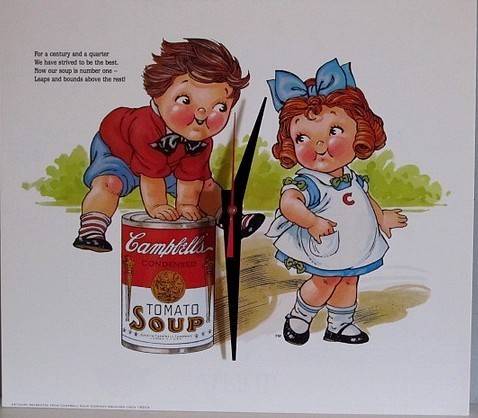 It's been a while since these children faced the resizing of the original illustrations created by Grace Weiderseim Drayton in 1904; they were slimmed down in 1983 by the artist who gave us the B.C. comic strip. At the time this change was called an "update" to the figures.
It's been a while since these children faced the resizing of the original illustrations created by Grace Weiderseim Drayton in 1904; they were slimmed down in 1983 by the artist who gave us the B.C. comic strip. At the time this change was called an "update" to the figures.
Pudgy people in advertisements were the norm in the early to mid-twentieth century, because a bit of roundness denoted ample resources and wealth. Gauntness wasn't an aesthetic so much as an indicator of poverty or malnourishment. Perhaps advertisers like to focus on whatever isn't the most common body type, but in any case, today the Campbell Soup Kids look like this:

Not only are they thinner but they're active, damn it. Even though they were active before. Wait. They're active and great passers. Or something.
Lots of familiar faces have gone through updates, especially when the product in question is slouching toward irrelevance. In the midst of the locavore movement away from processed foods, for example, the Green Giant got his own makeover. Before:

And after:
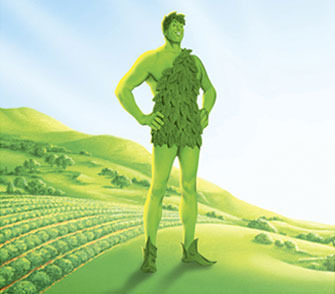
The legs are longer, not as thick as before (I'm trying to find a way to use "tree trunks" but failing). Biceps have less bulk, and once again, we see a thinner face like we do with the Quaker Oats man. But not those Campbell Soup Kids, whose faces are just as round as ever–I fear for their face edema, I really do.
Frozen vegetables may have fewer nutrients than their fresh counterparts, and more secrets about their manufacture than is readily available from one's neighborhood agriculture share farmer, but hey, the Jolly Green Giant looks great, doesn't he? And happy. I do want him to be happy.
All of these biggest loser moments make me wonder, though–why don't all processed food mascots change to reflect our current values? Why are we still looking at these people on our shelves, for instance?
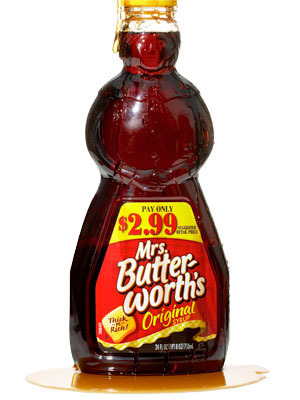
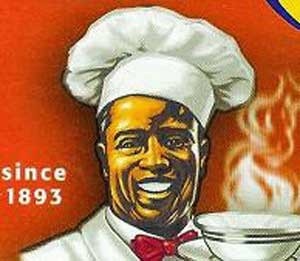
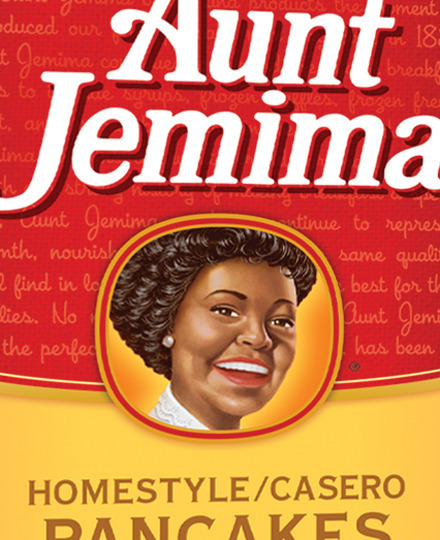
Oh wait, wait, Aunt Jemima has been updated. She used to look different:
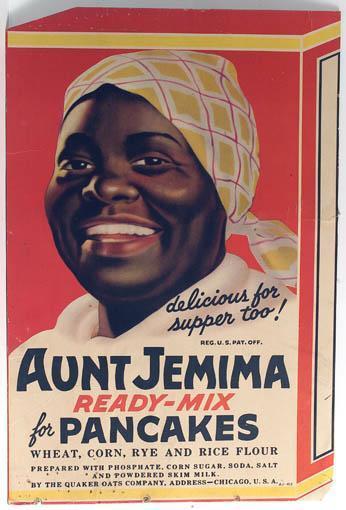 My bad.
My bad.








April 3, 2012
Where Trans People May Tread
Some amount of hay–I haven't quantified it in any way–has been made over the disinclusion of Jenna Talackova from the Canadian Miss Universe pageant. The usual suspects that get trotted out in the name of "unfairness" after all, couldn't be a part of the rationale for disqualifying her; Ms. Talackova's presumed muscle mass didn't matter in a non-physical contest, and her "male socialization" was moot given that by definition, the attributes sought after on the part of the judges would specifically be looking for gender neutral areas (as in the Q&A section) or feminine-coded areas, like how good contestants look in an evening gown or swimsuit. In other words, Ms. Talackova was either on equal par with the other candidates, or at a disadvantage, not an advantage.

But no matter, she was out. Until Donald Trump himself, manager of the whole affair, reversed his decision. Through his attorney, Michael Cohen, he said:
The Miss Universe Organization will allow Jenna Talackova to compete in the 2012 Miss Universe Canada pageant provided she meets the legal gender recognition requirements of Canada, and the standards established by other international competitions.
The application process does not make any mention of transgender inclusion or exclusion, so it's interesting that there was any basis to rule her out in the first place.Even conservative provacateur Bill O'Reilly came out in support of Ms. Talackova as a trans woman. The mind boggles.
This she's-out-she's-in hokey pokey has happened a good number of times before around the issue of trans women and men in competitions and in private groups. Earlier this year a teenage Girl Scout in California posted a video calling on people to boycott her organization's annual cookie sales–their major fundraiser–because one troop in Colorado had admitted a trans girl after initially denying her entry into that local affiliate. In this case the statement about Bobby Montoya's acceptance as a Scout focused on an earlier incorrect interpretation of the Girl Scout organization's rules for membership. For my part, I bought double the quantity of cookies I typically purchase in a given year. Go Girl Scouts!
Trans women's entry and participation in women's sports has been met with more resistance. Renee Richards had to go all the way to the New York Supreme Court in order to play in professional tennis as a woman. Lana Lawless settled her dispute with the Ladies Professional Golf Association (it's not for women, it's for ladies) after they changed their bylaws to include only "female at birth" players. Let me suit up for a run at the league, then. They have since changed this rule, as part of the settlement.
Even people assigned female at birth who seem too masculine have been subject to harsh scrutiny or expulsion from sports. Take the case of Caster Semenya, an Olympic-level runner who was ruled ineligible in international competition because coaches and players from other countries (Ms. Semenya is South African) thought she looked too masculine. She must have been on steroids, or maybe she was male and pretending to be female. Turns out Ms. Semenya is intersex, which makes her extremely public outing all the more horrifying for her. Imagine finding out very new information about your own gender because all manner of physical tests have been ordered for you, simply because you run quickly.
Trans men have been barred from organizations and competitions on a less spotlighted stage; the examples that come to mind include men's bodybuilding competitions and gay male organizations where well, genitals "come up" as part of the group's activities. But less attention and vitriol seems to have come against trans men seeking entry into male spaces. Perhaps we assume men need less protection from interlopers, or that they'll "handle" these folks on their own. There is a different calculus at work, so society decrees, in admitting people who once bore or may still bear male genitalia than admitting those who were born without it.
People not transgender need not see that they come into contact with gendered spaces, but they're present nonetheless. Have a gym membership? The entire premises, not just the locker rooms and rest rooms, are rife with gender expectations. Bodies are rarely more on display than at one's workout venue. Look around any workplace cafeteria, and one can find groups of men and women, clustered together, even as some others are at mixed tables. What's going on here? Women and men have learned different strategies for communication, which have offered them unequal comfort levels when conversing about non-work topics, so for some strata of the population, there's some gravitation toward their own sex when work isn't pressing them to talk to everyone.
What is less disconcerting to me than the drumbeat of exclusion for trans women from specialized activities they ought to be able to join are the reasons we exclude. Taken to its logical endpoint, and normal distributions what they are, the fears around physical prowess make no sense in an athletic environment–simply put, some women will always be stronger than others. And clearly, as new examples of exclusion show us, we are capable of excluding trans women even in non-physical settings, and even women the trans woman in question is so young as to have no physical advantage over her "born female" peers. What we're talking about on the most basic level, is attributing way more fear and power to the presence of one organ (or lack thereof), and I can't think of anything more disrespectful to the complexity of the human condition than that.








March 30, 2012
The Worst Jobs I’ve Ever Had
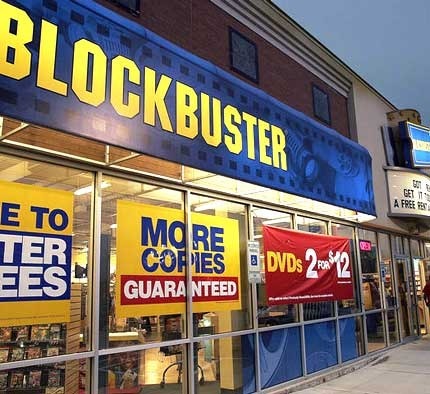 Writing books for a living looks like a great gig, from the outside. Well okay, it is. To be realistic, it’s a lot of work done over a period of years for no money, which is less than great. It also demands constant vigilance to one’s capacity for excellent time management, which yes, can put a damper on actually writing things. It’s a job in which self doubt and not office politics is on the ready to stifle productivity–and one gets familiar with the push-pull of internal conversations about choices, strategies, projects. All of this to say is, writing isn’t a perfect career, but it has its very nice moments.
Writing books for a living looks like a great gig, from the outside. Well okay, it is. To be realistic, it’s a lot of work done over a period of years for no money, which is less than great. It also demands constant vigilance to one’s capacity for excellent time management, which yes, can put a damper on actually writing things. It’s a job in which self doubt and not office politics is on the ready to stifle productivity–and one gets familiar with the push-pull of internal conversations about choices, strategies, projects. All of this to say is, writing isn’t a perfect career, but it has its very nice moments.
For sure, I’ve had my share of stink-ass jobs. You know the ones–they make you change whole vocational paths, send you back to school or new training, haunt your dreams, make you leave a cart of groceries in the store because oh no, that jerk from three jobs ago is in the next aisle, talking as loudly as ever. Not every job qualifies for this list. Garden variety crappy jobs need not apply.
Blockbuster Video–As part of my hire, I had to go out and buy khaki pants and a light blue dress shirt. In 1993, these came to $40. At the minimum wage back then, it would have taken three shifts to make back my investment in my future. After the first day, I closed my eyes to go to sleep and couldn’t get the image of restocking video boxes out of my mind. On the second day I broke up a fight between two retail colleagues. There never was a third day, because I was fired, miscommunicating with the store manager over whether I had Independence Day off or not. (Apparently I did not.) So I actually lost money on the little part-time job that couldn’t.
ChaCha Answer Service–First, I had to pass a test of my computer knowledge, which amounted not much more than knowing where the power and return buttons are located on my machine. The next screening had me looking up certain information to answer test questions posed to me. Once I passed this test then there was some more paperwork, initializing my account with ChaCha, and installing a special task bar. And then every time I had the browser open, I had to tell the task bar if I was working or not. If I was working, I faced a constant stream of interruptions with the most blase questions from strangers–who won the 2003 World Series? Which countries have joined the Kyoto Treaty? Who is the leader of Switzerland? Even in 2008, when I attempted this foray into the instant knowledge service industry, smartphones were uncommon. Nowadays there’s much less need for human intervention to answer questions instantly available online with a few taps on a screen. Which is great for those of us who don’t want to earn 14 cents an answer and be chained to our laptops.
 Food Service Work Study–College students are not known for their cleanliness. But someone has to wash all those hard plastic dishes and inexpensive flatware. And for one inglorious semester, that was me. To add to some context, let me point out that Syracuse University, where this work study took place, was the first university to irradiate all of its dining hall food upon receipt at its warehouse. Everything from the crumbling apples to the grainy tomatoes to the transparent spinach got its very own blast of radiation, which unfortunately did nothing to improve the taste of these products. So many of the dishes that rolled down the conveyor belt to my station were victims of angry unfed classmates. I saw tall constructions of mashed potatoes a la Close Encounters of the Third Kind. Worse, I had to deal with disgusting mashups of the special meat, drenched and overcooked green vegetables, and something that looked like it had once been in a Fruit Loops box. Or chewed up and spit out food; I’d come home smelling like I’d lounged in the deep fryer. The next semester I cajoled my way into working at the dorm satellite bookstore.
Food Service Work Study–College students are not known for their cleanliness. But someone has to wash all those hard plastic dishes and inexpensive flatware. And for one inglorious semester, that was me. To add to some context, let me point out that Syracuse University, where this work study took place, was the first university to irradiate all of its dining hall food upon receipt at its warehouse. Everything from the crumbling apples to the grainy tomatoes to the transparent spinach got its very own blast of radiation, which unfortunately did nothing to improve the taste of these products. So many of the dishes that rolled down the conveyor belt to my station were victims of angry unfed classmates. I saw tall constructions of mashed potatoes a la Close Encounters of the Third Kind. Worse, I had to deal with disgusting mashups of the special meat, drenched and overcooked green vegetables, and something that looked like it had once been in a Fruit Loops box. Or chewed up and spit out food; I’d come home smelling like I’d lounged in the deep fryer. The next semester I cajoled my way into working at the dorm satellite bookstore.
So yes, writing is better than any of these jobs, without question. Plus there’s a baby chewing on my sock as I type this.








The Worst Jobs I've Ever Had
 Writing books for a living looks like a great gig, from the outside. Well okay, it is. To be realistic, it's a lot of work done over a period of years for no money, which is less than great. It also demands constant vigilance to one's capacity for excellent time management, which yes, can put a damper on actually writing things. It's a job in which self doubt and not office politics is on the ready to stifle productivity–and one gets familiar with the push-pull of internal conversations about choices, strategies, projects. All of this to say is, writing isn't a perfect career, but it has its very nice moments.
Writing books for a living looks like a great gig, from the outside. Well okay, it is. To be realistic, it's a lot of work done over a period of years for no money, which is less than great. It also demands constant vigilance to one's capacity for excellent time management, which yes, can put a damper on actually writing things. It's a job in which self doubt and not office politics is on the ready to stifle productivity–and one gets familiar with the push-pull of internal conversations about choices, strategies, projects. All of this to say is, writing isn't a perfect career, but it has its very nice moments.
For sure, I've had my share of stink-ass jobs. You know the ones–they make you change whole vocational paths, send you back to school or new training, haunt your dreams, make you leave a cart of groceries in the store because oh no, that jerk from three jobs ago is in the next aisle, talking as loudly as ever. Not every job qualifies for this list. Garden variety crappy jobs need not apply.
Blockbuster Video–As part of my hire, I had to go out and buy khaki pants and a light blue dress shirt. In 1993, these came to $40. At the minimum wage back then, it would have taken three shifts to make back my investment in my future. After the first day, I closed my eyes to go to sleep and couldn't get the image of restocking video boxes out of my mind. On the second day I broke up a fight between two retail colleagues. There never was a third day, because I was fired, miscommunicating with the store manager over whether I had Independence Day off or not. (Apparently I did not.) So I actually lost money on the little part-time job that couldn't.
ChaCha Answer Service–First, I had to pass a test of my computer knowledge, which amounted not much more than knowing where the power and return buttons are located on my machine. The next screening had me looking up certain information to answer test questions posed to me. Once I passed this test then there was some more paperwork, initializing my account with ChaCha, and installing a special task bar. And then every time I had the browser open, I had to tell the task bar if I was working or not. If I was working, I faced a constant stream of interruptions with the most blase questions from strangers–who won the 2003 World Series? Which countries have joined the Kyoto Treaty? Who is the leader of Switzerland? Even in 2008, when I attempted this foray into the instant knowledge service industry, smartphones were uncommon. Nowadays there's much less need for human intervention to answer questions instantly available online with a few taps on a screen. Which is great for those of us who don't want to earn 14 cents an answer and be chained to our laptops.
 Food Service Work Study–College students are not known for their cleanliness. But someone has to wash all those hard plastic dishes and inexpensive flatware. And for one inglorious semester, that was me. To add to some context, let me point out that Syracuse University, where this work study took place, was the first university to irradiate all of its dining hall food upon receipt at its warehouse. Everything from the crumbling apples to the grainy tomatoes to the transparent spinach got its very own blast of radiation, which unfortunately did nothing to improve the taste of these products. So many of the dishes that rolled down the conveyor belt to my station were victims of angry unfed classmates. I saw tall constructions of mashed potatoes a la Close Encounters of the Third Kind. Worse, I had to deal with disgusting mashups of the special meat, drenched and overcooked green vegetables, and something that looked like it had once been in a Fruit Loops box. Or chewed up and spit out food; I'd come home smelling like I'd lounged in the deep fryer. The next semester I cajoled my way into working at the dorm satellite bookstore.
Food Service Work Study–College students are not known for their cleanliness. But someone has to wash all those hard plastic dishes and inexpensive flatware. And for one inglorious semester, that was me. To add to some context, let me point out that Syracuse University, where this work study took place, was the first university to irradiate all of its dining hall food upon receipt at its warehouse. Everything from the crumbling apples to the grainy tomatoes to the transparent spinach got its very own blast of radiation, which unfortunately did nothing to improve the taste of these products. So many of the dishes that rolled down the conveyor belt to my station were victims of angry unfed classmates. I saw tall constructions of mashed potatoes a la Close Encounters of the Third Kind. Worse, I had to deal with disgusting mashups of the special meat, drenched and overcooked green vegetables, and something that looked like it had once been in a Fruit Loops box. Or chewed up and spit out food; I'd come home smelling like I'd lounged in the deep fryer. The next semester I cajoled my way into working at the dorm satellite bookstore.
So yes, writing is better than any of these jobs, without question. Plus there's a baby chewing on my sock as I type this.








March 25, 2012
Useless Fears About Reading One’s Work
[image error]I’m reading this afternoon at In Other Words, the last nonprofit feminist bookstore in the country. The one featured in Portlandia, but I won’t mention that today when I’m there, in case they’re sore about it. As is typical for me and my neuroses, I have some worst-case scenarios in my head that won’t leave me alone, even though I know they’re extremely improbable. Here is the list of “what ifs” that I’ve dwelt on so far:
1. I will get motion sickness from trying to figure out how to use my new bifocals that I throw up on myself or the audience.
2. A recent rain in Portland will create a puddle over by the electrical panel and my mic will electrocute me when I’m talking about intimate like packing or breasts.
3. My ex will show up to challenge everything I wrote about him like I’m the next and more disappointing version of James Frey.
4. My bow tie will be too tight and my head will explode.
5. Everyone will realize that they’re so tired of my announcements about this reading they’ll decide not to show up after all. The coffee shop on the next block, however, will be swamped with an impromptu open mic event.
None of these are likely to happen, I know. But neither are they impossible. At least I haven’t envisioned the zombie apocalypse beginning at this very event.
Damn it!








Useless Fears About Reading One's Work
[image error]I'm reading this afternoon at In Other Words, the last nonprofit feminist bookstore in the country. The one featured in Portlandia, but I won't mention that today when I'm there, in case they're sore about it. As is typical for me and my neuroses, I have some worst-case scenarios in my head that won't leave me alone, even though I know they're extremely improbable. Here is the list of "what ifs" that I've dwelt on so far:
1. I will get motion sickness from trying to figure out how to use my new bifocals that I throw up on myself or the audience.
2. A recent rain in Portland will create a puddle over by the electrical panel and my mic will electrocute me when I'm talking about intimate like packing or breasts.
3. My ex will show up to challenge everything I wrote about him like I'm the next and more disappointing version of James Frey.
4. My bow tie will be too tight and my head will explode.
5. Everyone will realize that they're so tired of my announcements about this reading they'll decide not to show up after all. The coffee shop on the next block, however, will be swamped with an impromptu open mic event.
None of these are likely to happen, I know. But neither are they impossible. At least I haven't envisioned the zombie apocalypse beginning at this very event.
Damn it!








March 23, 2012
Mission Extremely Challenging, If Not Impossible
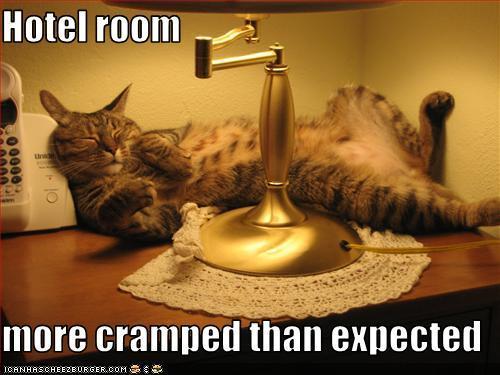 Five days we're here in Portland, ostensibly for Susanne's participation in a work conference, but I managed to finagle a reading on our last day, so both of us have a career moment or two while we're in town. The rest of our visit we get to see friends and some family, and take in the riches of urban life. While there are several nice upsides to living in Walla Walla, like no traffic or smog, cheap rent, and gorgeous sunny skies on most days, we've discovered we need frequent small breaks to nearby cities. Portland is three-and-a-half hours away by car, most of the drive along the picturesque Columbia River, the gem blue water reflecting the rusty, hard etched hills until the Cascade Mountains take over and pepper the terrain with thousands of evergreens. Leaving southeast Washington is a joy when the weather is agreeable.
Five days we're here in Portland, ostensibly for Susanne's participation in a work conference, but I managed to finagle a reading on our last day, so both of us have a career moment or two while we're in town. The rest of our visit we get to see friends and some family, and take in the riches of urban life. While there are several nice upsides to living in Walla Walla, like no traffic or smog, cheap rent, and gorgeous sunny skies on most days, we've discovered we need frequent small breaks to nearby cities. Portland is three-and-a-half hours away by car, most of the drive along the picturesque Columbia River, the gem blue water reflecting the rusty, hard etched hills until the Cascade Mountains take over and pepper the terrain with thousands of evergreens. Leaving southeast Washington is a joy when the weather is agreeable.
On the downside, all three of us are crammed into a decidedly not large hotel room, and nowhere in the complimentary Book of Mormon is there any advice on sudden downsizing of life and provisions with baby. I've looked.
First off, the baby expects life to be the same today as it was yesterday. When he needs to be changed there's no changing table. Want a specific toy? We only brought a few with us. No refrigerated teething ring? I know kid, it's a travesty. No really, it is. If I had teeth slowly emerging through my gumline, I'd want something to numb the pain, too. And yet, neither of the caregivers in this picture remembered any such thing.
Worse however is trying to foster sleeping in such a small space. The baby's portable crib is a scant eighteen inches from the bed. Not only is it another short-term replacement in the baby's life, but there is no sound barrier to muffle the adult goings on in the rest of the room. When it comes right down to it, nearly everything makes noise. Keys on a laptop. A pen moving over paper. Shifting in a swiveling office chair, opening a drawer. Even with the bathroom door shut all of the sounds related to one's business in there are transferred into the main room, and god forbid there's some squeaky plumbing to deal with. I also have a gripe with whoever made the light switch plates snap with a loud clack. You were not thinking of slumbering babies, were you? No, you were not.
No sooner would the baby finally nod off then one of us would cough, sneeze, or continue our normal respiration and then he'd be awake, wailing with the misery of it all. A few occasions found him slightly happier, and mumbling in that way that babies do–ah ba ba ba da ba eh. While these may be adorable sounds, I'm not especially excited to hear them when it's 3:27 in the morning. Or at 4:14, as it turns out.
I crept to the bathroom at some point, a thin slice of light my only guide. I knew that somewhere in the room was the–ouch, yup, there's the stroller, crushing my big toe. Poor big toes, always the scouts of the foot world, always the first to take heavy damage in a collision encounter. Now there was a veritable smorgasbord of sound: plastic and flesh in contact, the "oof" of the foot bearer, and the pinched roll of the wheel against carpet. Nothing that would hold up against, say, a jet engine by GE, but because it was within eight inches of my child's eardrums, was more than enough to wake him. He has never crushed those eardrums at a concert overused a set of headphones, after all. Those puppies are pure, and hear the International Space Station up in orbit.
Squeal, said the baby. Hush, you're okay, said the papa, trying to sound reassuring and not at all discombobulated. I'm sorry you're offended by my inadvertent self-injury. I'll try not to stub my toe in your presence again.
Slowly he settled down. I limped into bed as quietly as an exhausted person can. The sheets moved as I slid over.
The baby woke. And we started our soothing process all over again. I'm happy to have some time out of Walla Walla, but perhaps next time we should rent a condo.











